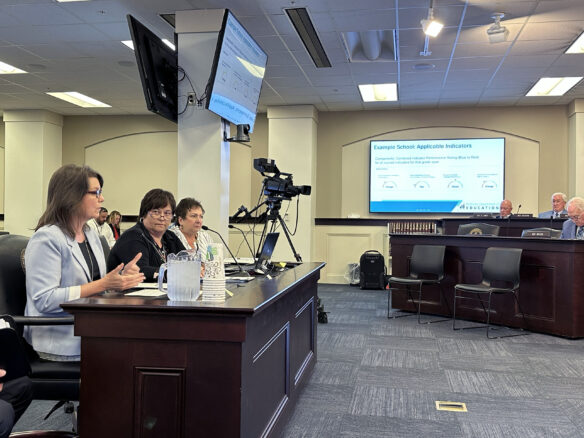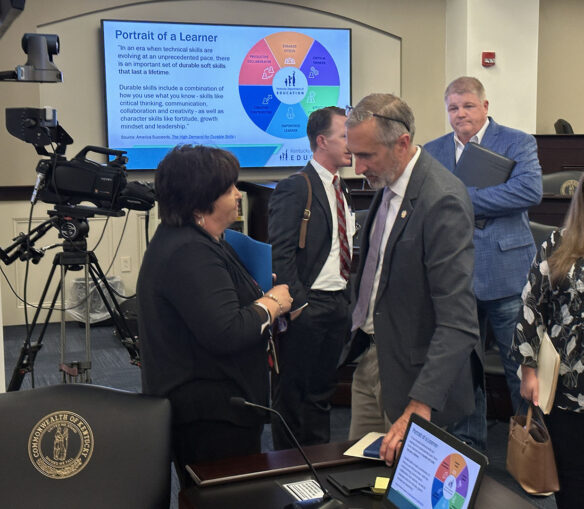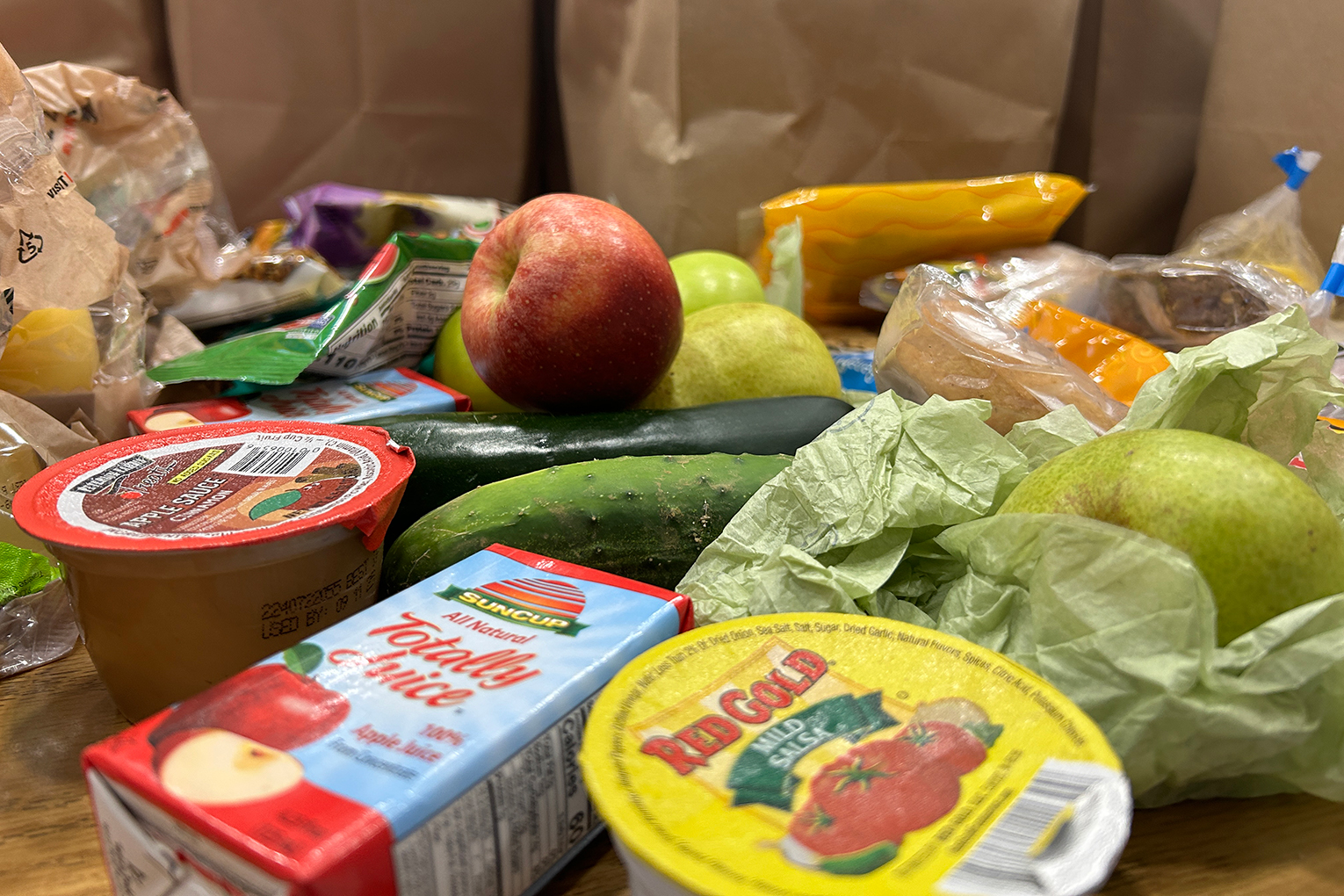
Members of the Kentucky Department of Education and the Kentucky Board of Education present the vision for the future of learning in the Commonwealth to the Kentucky General Assembly’s Interim Joint Committee on Education on June 6, 2023. Photo by Toni Konz Tatman, Kentucky Department of Education
Officials with the Kentucky Department of Education (KDE) and the Kentucky Board of Education (KBE) presented an overview on assessment and accountability and discussed how the agency is innovating for the future during the June 6 meeting of the Interim Joint Committee on Education.
KBE Chair Lu S. Young credited “communities across the Commonwealth who are engaging in this notion of United We Learn – a play on our own state’s motto – thinking about how we can lock arms with the communities to envision a bold new future for education in the Commonwealth.”
United We Learn is the name for Kentucky’s vision and builds around three big ideas: creating a more vibrant experience for every student; encouraging innovation in schools, especially when it comes to assessment; and creating a bold new future for Kentucky’s schools through collaboration with their communities.
That vision means everyone in the Commonwealth – educators, families, students, community members, business leaders and policymakers – working together to support public schools in “bringing about deep and authentic learning experiences for all students,” Young said.
The conversation with the legislative panel began with a look back at where the Commonwealth has been since the Kentucky Education Reform Act of 1990, to where schools are now with the current state and federal testing and accountability requirements. KDE officials also shared five years of student performance data.
“I am really proud of the work that has happened over time, but it is time to reconsider some of that backdrop about assessment and accountability as we move into 2023 and beyond,” Young said. “This has been about deep community engagement. … We have had hundreds of conversations … about what we want from Kentucky’s public schools.”
“We have this opportunity to think about how deep and authentic learning experiences can become the norm in Kentucky,” she added.
United We Learn is being embraced through community partnerships such as the Local Laboratories of Learning, called L3s, in which districts and community members create a system of assessment and accountability that reflects the diversity of students, families and the community.
Lessons learned from the L3s will be shared with districts across Kentucky, and help inform how the statewide assessment and accountability system will evolve through United We Learn.
In addition, KDE has brought together a diverse set of stakeholders to form the Kentucky United We Learn Council. Members have been working and learning together in an inclusive and empathetic way to explore how to advance the ideas of United We Learn at the state and local level.

KDE Associate Commissioner Rhonda Sims talks with Kentucky Sen. David Givens following the June 6 meeting of the Interim Joint Committee on Education. Photo by Toni Konz Tatman, Kentucky Department of Education
“One of the things we are leveraging is the Kentucky Portrait of a Learner,” Young said. “Our state board of education adopted this portrait last October as a model. It is not mandated in any way. We will learn from our local communities about what works and should be regulated.”
The portrait articulates a statewide commitment by the KBE to the knowledge and skills all students in the Commonwealth should have and be capable of by the time they graduate.
“The idea here is durable skills,” Young said. “We want our communities to be more prosperous and we believe that public education is one of the main engines by which that prosperity can happen.”
By the time a student graduates, the KBE said they should be:
- A Critical Thinker;
- An Effective Communicator;
- An Empowered Learner;
- A Productive Collaborator;
- An Engaged Citizen; and
- A Creative Contributor.
Young said it is about “balancing the assessment and accountability system so these skills matter along with – not instead of – reading and math and content areas. How will we find a better balance moving forward?”
Michael Hesketh, president of Superb IPC, a powder coating and industrial solutions company in Shelby County, spoke on the importance of this new initiative in preparing a ready workforce.
“We are starting to see (students) understand the ‘why.’ So many times we went through education and we are learning things and we start to question why we are learning things,” he said.
During deeper, more vibrant learning, Hesketh said students also are learning “how” because they are implementing, often as a collaboration.
“And in the midst of implementing it, we all know, it doesn’t always work out like you thought,” he said. “But that life lesson that they are getting … (is) the skill of experimenting and practicing, trying things and learning.”
Sen. Shelley Funke Frommeyer (R-Alexandria) said she recently attended graduate defenses at Pendleton County High School and, “portrait of a learner was emulated by the seven teachers who invited me as we walked down to see the students.”
“The teachers have risen to the challenge of preparation,” she said. “I think you are on to something enormous with the community having a better understanding and getting community partners involved.”
Funke Frommeyer asked how the state can better train local school boards about the the importance of the portrait, as well as allocate funds to support it.
“There is an importance of professional learning for teachers and this (goes) for all of the grown ups,” Young said. “We have more than 100 schools districts in Kentucky now who have a portrait and those are almost all locally adopted by the school board.”
“The groundswell is beginning to happen across the Commonwealth,” Young said. “I think ultimately the long game … will come in the form of a better and improved workforce. When Pendleton increases the number of highly skilled workers for the region you (should be able to follow these dollars and) begin to monetize the experience they have had in their public schools in the workforce. We can follow these dollars toward the implementation of the portrait.”
Rep. James Tipton, chairman of the House Education Committee, said the discussion around innovation and assessment is a critical and important conversation that must continue. Tipton is a member of the Kentucky United We Learn Council.
“This is not a criticism, (but) we have to do better,” he said. “Our citizens and our students, … we have to do better. Our children deserve us to do better, we’ve got to analyze the data and figure our how we can improve the educational system in Kentucky because it’s our future.”




Leave A Comment